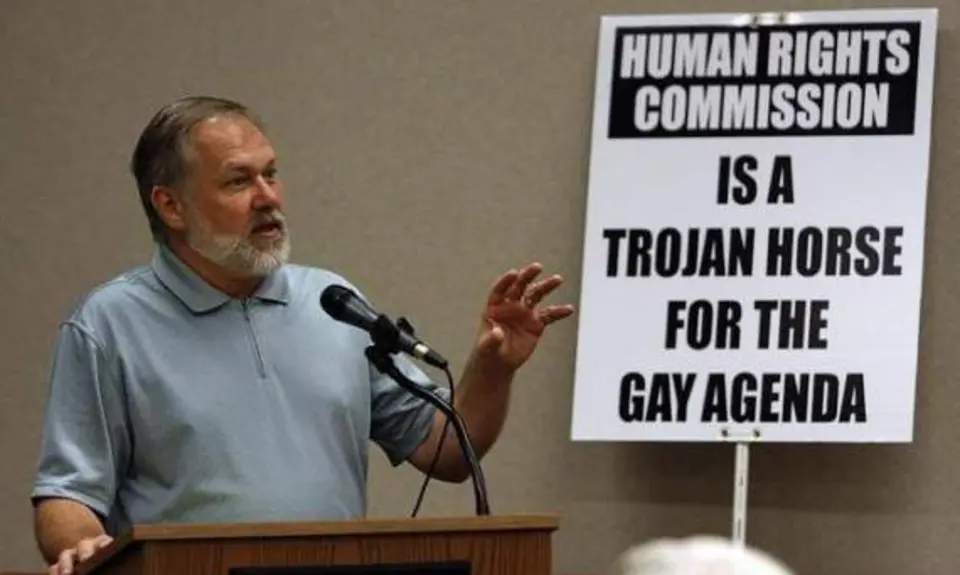Writing today in WorldNetDaily, anti-gay pastor Scott Lively lauded President Trump as “an American hero in the mold President Ronald Reagan” and urged him to “follow Reagan’s lead on ‘gay’ issues” by protecting “society from the destructive ‘gay’ agenda.”
“It is very hopeful that one of President Trump’s first acts in office was to scrub the White House website of references to the LGBT agenda, which had been Barack Obama’s top global priority,” he wrote.
Lively also hailed Trump’s pledge to pick a Supreme Court justice resembling the anti-gay Justice Scalia and noted that Trump’s agenda closely resembles his own campaign platform from his 2014 gubernatorial bid in Massachusetts.
Lively called on Trump to implement the “Separation of LGBT and State” by undermining “sexual orientation regulations,” or nondiscrimination laws, and ending the supposed government promotion of homosexuality.
Trump has already said that he would sign into law a bill that allows anti-LGBT discrimination.
In his first few days, President Trump has proved to be an American hero in the mold of President Ronald Reagan, and he should follow Reagan’s lead on “gay” issues. Like Mr. Trump, Ronald Reagan rightly had a high level of respect for homosexuals as persons, but as president, Reagan recognized his duty to protect society from the destructive “gay” agenda, whose goal since the Stonewall Riots of 1969 is not tolerance but absolute cultural supremacy. He fulfilled that duty by appointing the pre-eminent jurist of the 20th century, Antonin Scalia, to the United States Supreme Court. Justice Scalia then wrote the majority opinion in Bowers v. Hardwick (1986), which recognized the clear constitutional authority of all 50 states to regulate harmful sexual conduct, specifically including sodomy. (Mr. Trump should remember this when appointing Justice Scalia’s replacement.)
It is very hopeful that one of President Trump’s first acts in office was to scrub the White House website of references to the LGBT agenda, which had been Barack Obama’s top global priority. The euphemistically named Human Rights Campaign (HRC) condemned the move, but I vigorously applaud it and would like to offer a few suggestions for how the Trump administration should deal with LGBT issues.
…
When I ran for governor of Massachusetts in 2014, my platform was quite similar in several key aspects to that of Mr. Trump, and in fact I sometimes wondered if his campaign manager had read my website. (The biggest difference was I stated openly and often that I didn’t run to win, but only to have a platform to promote biblical values in the political arena.) At the start of my effort in November 2012, I laid out what was then a unique populist vision for Republicans, in an article titled “Time for a New Coalition in the GOP.”
Later, when I began actively campaigning across Massachusetts, I issued a White Paper regarding “gay” issues, on the theme of “Separation of LGBT and State”:
…
For example, government would no longer be allowed to promote the legitimacy of homosexual, bisexual and transgender conduct in public schools, but students could still form student clubs based on their personal choices. Activists could still hold public parades, but government officials would be restricted from marching in their official capacity. LGBT groups could establish community organizations, but no taxpayer money could be used to create or support them. … In every way that Christianity is restricted in public life, the LGBT agenda should be restricted.”
I went on to state that in contests between Christian and LGBT activists, the First Amendment must always trump “sexual orientation” regulations.
I urge President Trump to amend all existing sexual orientation regulations with following clause:
“In no circumstance shall sexual orientation regulations supersede the First Amendment rights of individuals, churches and religious organizations to freedom of speech and the free exercise of religion.
“For the purpose of this statute religious organizations are those whose policies or culture are substantially influenced by religious values, including but not limited to Christian bookstores, adoption agencies, hospitals, businesses, social organizations and student clubs on college campuses.”





